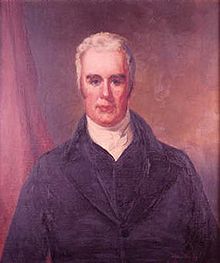Charles Carnan Ridgely
| Charles Carnan Ridgely | |
|---|---|

Charles Ridgely of Hampton by Florence MacKubin. Part of the Maryland Commission on Artistic Property.
|
|
| State House of Delegates District, Baltimore County | |
|
In office 1790–1795 |
|
| Constituency | Baltimore County |
| 15th Governor of Maryland | |
|
In office January 2, 1816 – January 8, 1819 |
|
| Preceded by | Levin Winder |
| Succeeded by | Charles Goldsborough |
| Member of the Maryland Senate | |
|
In office 1796–1800 |
|
| Personal details | |
| Born |
December 6, 1760 Baltimore, Province of Maryland, British America |
| Died | July 17, 1829 (aged 68) Baltimore County, Maryland, U.S. |
| Resting place | Family Vault, Hampton, Baltimore, Maryland |
| Spouse(s) | Priscilla Dorsey |
| Children | Charles Carnan Ridgely Jr. Rebecca Dorsey Ridgely Priscilla Gough Ridgely John Carnan Ridgely Prudence Ridgely Achsah Ridgely Henry Ridgely Priscilla Hill Ridgely Eliza Ridgely David Latimer Ridgely Sophia Gough Ridgely Mary Ridgely Harriet Ridgely |
| Residence | 'Hampton', Baltimore County, Maryland |
| Profession | Politician |
| Religion | Episcopalian |
Charles Carnan Ridgely (December 6, 1760 – July 17, 1829) was born Charles Ridgely Carnan. He is also known as Charles Ridgely of Hampton. He served as the 15th Governor of the state of Maryland in the United States from 1815 to 1818. He also served in the Maryland House of Delegates from 1790 to 1795, and in the Maryland State Senate from 1796 to 1800. Charles was born in Baltimore. He was the son of John Carnan and Achsah Ridgely, sister of Captain Charles Ridgely. The Maryland Gazette described him as an aristocrat.
"As a Senator or Delegate, justly appreciating the merits and demerits of the human character, he always avoided visionary schemes and dangerous experiments." (Maryland Gazette) Ridgely devoted his tenure to internal improvements. He devoted his attention to the state during the unpopular war with Great Britain. It appropriated ground for the erection of a Battle Monument in Baltimore, aided education, and chartered manufacturing and insurance companies, so that 'during his administration, the State enjoyed its greatest period of prosperity.' Ridgely passed an act which provided education for the poor in five separate counties; which was seen as important to the early development of public education in Maryland. A second act created the Commissioners of the School Fund. The act appropriated a fund to establish free schools within the state of Maryland.
Carnan's uncle, Captain Charles Ridgely, willed his estate, Hampton, to him on the condition that he assume the name Charles Ridgely; he did so legally in 1790. When Charles's uncle, Captain Ridgely, died in 1790, Ridgely became the second master of Hampton. The concept of Hampton was inspired by Castle Howard in North Yorkshire, England, owned by relatives of his grandmother. He had 10,590 feet (3,228 m) of irrigation pipes laid in 1799 from a nearby spring to provide water to the Mansion and the surrounding gardens, which he was extensively developing. Prominent artisans of the time were hired to design geometric formal gardens, which were planted on the Mansion's grounds between 1799 and 1801. An avid horseman, Charles Carnan also began raising Thoroughbred horses at Hampton, where he had a racetrack installed. A 1799 advertisement promoted the stud services of his racehorse, Grey Medley. Another of Ridgely's racehorses, Post Boy, won the Washington City Jockey Club cup.
...
Wikipedia
